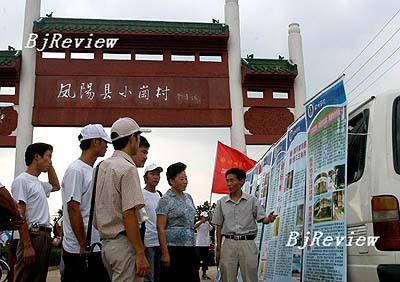|

Before 1978, Xiaogang Village, a small farming village along the Huaihe River, was known only for its poverty. Its 20 households and around 100 villagers mostly depended upon state relief funds and loans to ease their continual crop failures. Agriculture was inconsistent in the region because of a stagnated river channel, leading to floods and droughts that hit the area in successive years.
According to people who lived there at the time, in the past, it was extremely difficult for girls from the village to obtain a good dress for their marriage. For young men, it was even harder to find a wife from nearby villages.
In 1978, Xiaogang suffered from a great drought and farmers starved in these miserable conditions. That's when Yan Junchang and Yan Hongchang, two local leaders, decided to do something to change the situation. They called together the heads of all the local households for a meeting. After a short discussion they made a radical decision: abandon the long practised communal farming system and divide the land among themselves. Such a practice was illegal at the time.
They drew up a contract that divided the commune's land into family plots. They would turn their production quotas over to the state and the leadership, and keep whatever remained. Under the commune production system at the time, keeping any communal grains was forbidden.
"If the trial fails, we cadres are prepared for death or imprisonment under the law, and other commune members pledge to raise our children until they are 18 years old, when they become adults," the contract concluded.
However, that secret pact is now considered the first bold step toward rural reform in China.
For most of the country's rural population, agriculture is the most vital source for livelihood and security. After the founding of the People's Republic of China in 1949, the government helped farmers reallocate land through agrarian reform.
In Fengyang County, where Xiaogang is located, farmers were organized into collective farming districts. During that period, late Chairman Mao Zedong also implemented a project to regulate the nation's waterways. Reservoirs and water reserve areas were built up, several canals were dredged and levees were heightened and consolidated to control flooding. After waterways were regulated and agriculture collectivized, annual grain production began to stabilize. The problem of food shortage had been fundamentally solved.
During the Great Leap Forward in 1958-60, communes were set up as the organs of both state power and productive labor. Dozens or even hundreds of cooperatives at different economic and development levels were merged. The experiment eventually proved disastrous and ruined the agricultural industry of the country.
Villagers from Xiaogang knew that creating secretly contracted farming plots would be a great political risk. But they had few alternatives. In less than one year, they harvested nearly 70,000 kg of grain and the years of starvation gradually ended. Though output did not reach the level of 100,000 kg at the preliminary stage of collectivization, it increased from then on.
Other people began to notice that Xiaogang farmers went unpunished so they followed suit and reclaimed their fields with their own reform plans. Then in April 1979, the Communist Party of China Central Committee made a decision to speed up agricultural development and began a series of reforms. The reforms the Xiaogang farmers started began to spread outside of Anhui Province and the obsolete commune system was replaced with the "household contract responsibility system."
In the early 1980s, the Central Government decided to give long-term leases to farmers on the collectively owned farmland. Under the new system, the proprietary land is still collectively owned, but the land use rights are distributed to rural households for independent operation. Households have become the main economic unit of the agricultural production system in rural China.
Generally speaking, the farmers were allowed to keep any grain after paying rent on the farmland. They could then trade their agricultural products to grain procurement agencies, cooperatives or individual businesspeople, or sell them in urban markets. According to an official from the Ministry of Agriculture, the household contract responsibility system accords with the interests of the Chinese people and the fundamental realities of the country, and enables most farmers in the country to live a life with enough food and clothing. | 